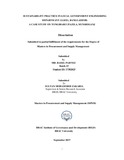Sustainability practice in Local Government Engineering Department (LGED), Bangladesh: a case study on Tongibari upazila, Munshiganj

View/
Date
2017-09Publisher
BRAC UniversityAuthor
Parvez, Md. RaselMetadata
Show full item recordAbstract
Sustainable procurement (SP) is a procurement method that is concerned with the
principles of sustainable development, such as ensuring a healthy society, living within
environmental limits, and promoting good governance incorporating with economic,
environmental and social aspects of sustainability. Public procurement is concerned with how
public sector organizations spend tax payers’ money for development of country. Public
procurement is guided by four principles: transparency, accountability, equity to all tenderers,
and fair competition for all tenderers. Local Government Engineering Department (LGED) is
one of the largest public sector organizations in Bangladesh entrusted for planning and
implementation of local level, rural urban and small scale water resources infrastructure
development programs who procures goods, works and services as a large scale. A case study is
conducted with LGED officials addressing three aspects of sustainability to know the current
scenario of sustainable procurement practice in the public sector in Tongibari upazila,
Munshiganj. The case study concludes that officials have fair understanding on sustainability
issues with little bit preparedness to implement it in their procurement process. Upazila
procurement system still follows the lowest price approach rather than whole life costing
approach to select contractor at upazila level. Upazila procurement systems follow all
sustainability clauses which are mentioned in PPR-2008. Besides, there is no mechanism in
upazila procurement system to check the environmental performance of contractors.
Sustainability criteria should be embedded in procurement process with detailed sustainable
procurement policy with the help of sustainable procurement champion and public procurement
framework. A clear commitment is necessary between the top level of government and upazila
level through proper channel. Adequate training on sustainable procurement for all stakeholders
including procuring entities, suppliers and beneficiaries is necessary in order to increase
knowledge for implementing sustainable procurement. Finally, there is scope to further study
about the sustainability issues in public procurement at other upazila. Advanced research needs
to be conducted in order to get a deeper insight into the sustainability issue in relation to the
public procurement.
